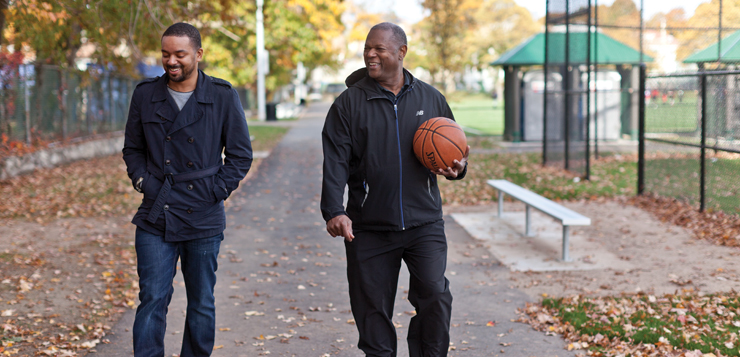A man of both action and words, George Mumford, NBA Meditation Coach and author of The Mindful Athlete, takes time to engage deeply with a book. For the past thirty years, he has read a book a week, so that ideas and practices from varied sources continue to shape his understanding and his teaching.
Flow: The Psychology of Optimal Experience
By Mihaly Csikszentmihalyi
This groundbreaking book provides insight into what’s needed to get into flow, when time alters and you become so absorbed in whatever you’re doing that nothing else matters. The key, in Mumford’s view, is learning to be comfortable with being uncomfortable. “The best moments of our lives,” writes Csikszentmihalyi, are “when a person’s body or mind is stretched to the limits in a voluntary moment to achieve something difficult and worthwhile.”
Zen in the Art of Archery
By Eugen Herrigel
An enlightening, no-nonsense account by a German philosophy professor of his quest to learn zen archery in Japan after World War II. What he discovered is that the secret was letting go of his willful self. As Herrigel puts it, “The archer ceases to be conscious of himself as the one who is engaged in hitting the bull’s-eye which confronts him. This state of unconscious is realized only when, completely empty and rid of the self, he becomes one with the perfecting of his technical skill.”
The Inner Game of Tennis
By W. Timothy Gallwey
Gallwey, a former tennis instructor and meditation student, provides instruction on how to improve performance by getting out of your own way and letting your best game emerge. By focusing on expanding awareness, Gallwey says, you can diminish the dominance of your critical mind, or what he calls Self 1, and let your true potential, Self 2, do what it instinctively knows how to do.
Second Wind: The Memoirs of an Opinionated Man
By Bill Russell and Taylor Branch
A revealing book about a legendary basketball star’s journey to master the inner game. One memorable moment is the story of how Russell learned visualization as a boy studying the paintings of Leonardo da Vinci and Michelangelo and then used that skill to invent a new way of blocking shots and playing defense. He also relates how he would sometimes silently cheer for his opponents to up their game so he could experience an intense “mystical” competition, one that transcends competing.
The Three Laws of Performance: Rewriting the Future of Your Organization and Your Life
By Steve Zaffron and Dave Logan
What role does language play in bringing about change? Quite a lot, according to management consultants Zaffron and Logan, who’ve identified some basic laws that shape how individuals buy in to new ideas and coalesce into successful teams. The laws are: 1) how people perform correlates to how situations occur to them, 2) how situations occur arises in language, and 3) future-based language transforms how situations occur to people. If you change the way things occur to people with the subtle use of language, Zaffron and Logan contend, the group’s actions will naturally shift.
The Four Agreements: A Practical Guide to Personal Freedom
By Don Miguel Ruiz
A down-to-earth, surprisingly profound book by a shamanic teacher on the practical wisdom of his Toltec ancestors. The agreements are: 1) be impeccable with your word, 2) don’t take anything personally, 3) don’t make any assumptions, and 4) always do your best. Putting these tenets into practice, Ruiz demonstrates, requires taking a hard look at ourselves and unraveling the counter- productive agreements currently running our lives.
Mind and Brain A Critical Appraisal of Cognitive Neuroscience
By William R. Uttal
A critical look at the latest developments in neuroscience and recent attempts to align neural mechanisms with psychological processes. Especially interesting, says Mumford, is the research on how volitional effort can create neuro-pathways in the brain that can change behavior.
Introducing NLP Psychological Skills for Understanding and Influencing People
By Joseph O’Connor and John Seymour
This clearly written guide to neuro-linguistic programming provides some useful insights into how the mind works. One of the most valuable parts, according to Mumford, is the practical instruction on how to process verbal and non-verbal information more effectively and program yourself for excellence.
The Cambridge Handbook of Expertise and Expert Performance
Ed. by K. Andres Ericsson, Neil Charness, Paul J. Feltovich, and Robert R. Hoffman
An encyclopedia of peak performance by some of the world’s leading experts on expertise. Filled with illuminating case studies, this sweeping overview explores in detail the innovative methods that the best and the brightest in a wide range of fields use to achieve success.
The Power of Awareness
By Neville Goddard
An inspiring work by a former dancer-turned-metaphysician on how to create the life you want by harnessing the power of the imagination. As Mumford describes Goddard’s approach, “Your imagination is everything. You create your reality by what you focus on. You become what you think.”






